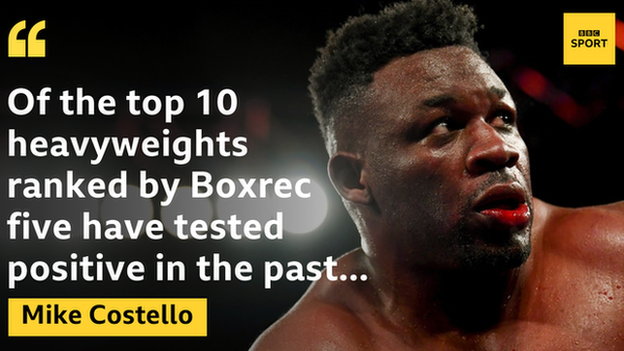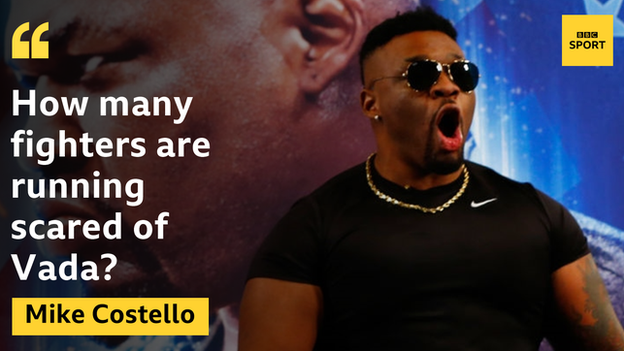Costello & Bunce: Miller's Joshua calamity leaves testing questions for boxing
- Published

Jarrell Miller, Tyson Fury, Luis Ortiz, Dillian Whyte and Alexander Povetkin have all faced drug controversy
Jarrell Miller's behaviour has been called "disgusting", some say he "threw away a winning lottery ticket" and others want him banned for life.
The American's failed drug tests - ruling him out of a chance to face Anthony Joshua for the richest prize in boxing - has reopened the dialogue on cheats in the ring.
Furthermore, the difficulty Joshua's team found in securing a replacement opponent led to theories that elite fighters had turned him down because they may not be able to clear their bodies of performance-enhancing drugs at such short notice.
Joshua now has another opponent in Andy Ruiz Jr but BBC Sport boxing commentator Mike Costello, BBC Radio 5 Live analyst Steve Bunce and countless others from the boxing fraternity have had their say on a heavyweight division facing ugly headlines.
'Why believe in heavyweight boxing?'
Miller returned three adverse findings in tests, with EPO, human growth hormone and endurance-boosting GW1516 showing up in blood or urine samples.
"What's in your mind when you're getting over $6m - life-changing money - and yet you're still committed to using something you understand is breaching rules and you know there's no escape? I can't work that one out," Matchroom Sport chairman Barry Hearn told BBC Sport.
Mark Tibbs - trainer of British heavyweight Dillian Whyte - called Miller "disgusting" and said he was throwing "a winning lottery ticket", while boxing analyst Spencer Fearron called him "a punk".
"It's disgraceful and I have no time of day for him," added Fearron.
Such reaction has been pretty typical and - not for the first time - forced uncomfortable truths to be confronted.
"I can't be a hypocrite, I can't watch the Tour de France any more as I can't believe what I am looking at after all the stories," said BBC Sport boxing correspondent Mike Costello.
"In the 100m in athletics, six of the 10 fastest men in history have tested positive. Today, of the top 10 heavyweights as listed by Boxrec rankings, five of the top 10 have tested positive in the past.
"You could ask me why I still believe in boxing. How much longer can you believe in heavyweight boxing? In boxing as a sport? Or do you care?"
Are fighters scared of Vada?

The Voluntary Anti-Doping Association (Vada) operates in boxing and mixed martial arts
Many among the sport's elite now care enough to enlist the Voluntary Anti-Doping Association - the body who caught Miller - to oversee their fights.
Vada operates solely in boxing and mixed martial arts and, for a fee, will conduct testing which Hearn himself says is "very thorough".
The Las Vegas-based organisation claims testing by other local authorities is often "not comprehensive, rarely unannounced and not a deterrent".
Pricing varies, but an eight-week programme overseen by Vada can cost around $50,000.
"We've spoken about this for a long time, and testing doesn't come cheaply," said Costello. "You have to be earning hefty purses as a fighter for it to be worthwhile.
"In the UK there is also UK Anti-Doping testing which is government funded and not nearly as comprehensive or claustrophobic around fighters as Vada."
Bunce added: "The fee rules it out of maybe eight out of 10 world title fights. There has to be a middle ground between cash-strapped Ukad in this country as opposed to the straightforward 'you pay your cash and we clean your sport' Vada."
Vada has caught high-profile names such as Mexico's Saul 'Canelo' Alvarez in recent years, strengthening its position to a point where fight promoters now actively publicise aligning their big fights with the organisation.
In the aftermath of Miller's failed tests, promoters and fighters have questioned why some heavyweights - vocal in their desire to face Joshua - have since distanced themselves from the challenge, despite the money and belts on offer.
Costello added: "I wonder if what happened to Miller, the effectiveness of Vada, who have caught heavyweights in recent years, has that impeded negotiations for other fighters to face Joshua? How many fighters are running scared of Vada?"
Are lifetime bans too harsh?
The WBA moved to ban Miller for six months after his drugs tests. British light-middleweight Anthony Fowler called for a lifetime ban, a call echoed by his compatriot, former world cruiserweight champion Tony Bellew.
Bellew believes the sport is "10 times more dangerous" if a drug cheat is in the ring and has suggested tragedy might need to strike before boxing authorities stiffened penalties.
"I sat opposite Miller - a smart guy," said Bunce. "He conned us with his stupid act. He's a nice guy but what he has done is so amateurish, so pathetic, so knee jerk, so ridiculous. He deserves far more than a two-year ban."
Among boxing's elite names, Miller, Tyson Fury, Luis Ortiz, Alexander Povetkin and Dillian Whyte have all returned adverse drug findings.
"It's more a question of who is out there clean to fight," added Hearn. "We have seen too many failed tests."
The reasons for failed tests have been varied. Some - like Whyte - were punished for using supplements, unaware of their true contents. Fury suggested uncastrated wild boar as the reason for his failed test in 2016.
Such variations in fault and intent can make gauging the appropriate penalty a challenge.
Hearn says he "doesn't believe in lifetime bans for anything" but that two years should be seen as a minimum punishment.
Costello added: "That's the difficulty the testing authorities, and the bodies who impose suspensions and fines, have - firstly detecting how much was knowingly taken and secondly how you measure one substance against another.
"Knowing the people we have met over the years in boxing, we can see how it would be easy to make a mistake once.
"I don't believe in lifetime bans for first offences but once you have, if you transgress a second time, I am certainly in favour of lengthy bans, way beyond two years.
"In athletics, the most serious offences have been punished by four years not two years. That's an Olympic cycle. I wouldn't actually grumble with a lifetime ban in boxing for a second offence.
"This is an issue which is unlikely to resolve itself any time soon."